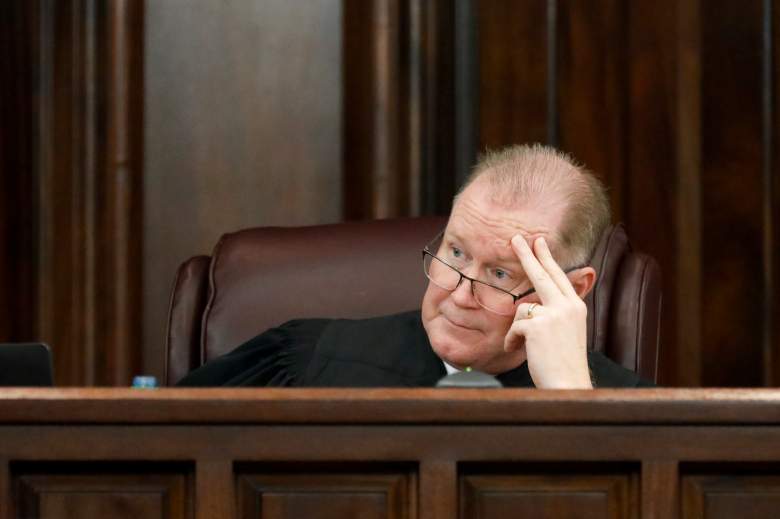
Getty Judge Timothy Walmsley looks on during the trial of Ahmaud Arbery's alleged killers at Glynn County Superior Court on November 19, 2021 in Brunswick, Georgia. Greg McMichael, his son Travis McMichael, and a neighbor, William "Roddie" Bryan are charged with the February, 2020 fatal shooting of 25-year-old Ahmaud Arbery.
Judge Timothy Walmsley was the presiding judge over the Ahmaud Arbery murder trial in Glynn County Superior Court in Brunswick, Georgia. Arbery, 25, was jogging through the neighborhood when he was chased by men in a truck and gunned down with a 12-gauge shotgun in the Satilla Shores neighborhood in Glynn County February 23, 2020. Greg McMichael, his son Travis McMichael, and a neighbor, William “Roddie” Bryan were charged with nine counts including felony murder.
Walmsley has served as Superior Court Judge since his appointment by then-Governor Nathan Deal. He started his career in environmental work.
The jury found Travis McMichael, Greg McMichael and Bryan guilty of felony murder after lengthy deliberations concluding Wednesday, November 24, 2021, according to CNN. Walmsley sentenced the McMichaels to life in prison without the possibility of parole on Friday, January 7, 2022, and sentenced Bryan to life in prison with the possibility of parole.
Before he proceeded with the sentencing, Walmsley held one minute of silence for Arbery.
“That one minute represents a fraction of the time that Ahmaud Arbery was running in Satilla Shores,” he said.
Walmsley said Abery was chased for about five minutes.
“When I thought about this, I thought from a lot of different angles, and I kept coming back to the terror that must have been in the mind of the young man running through Satilla Shores,” he said.
Travis McMichael was found guilty of malice murder, four counts of felony murder, two counts of aggravated assault, false imprisonment and criminal attempt to commit a felony, CNN reported. Bryan was acquitted on the malice murder charge but found guilty of felony murder. Gregory McMichael was also found guilty of felony murder. Bryan and Greg McMichael face a maximum sentence of life in prison without the possibility of parole. Travis McMichael faces a minimum sentence of life in prison, according to CNN.
The three men are also facing federal charges. The federal trial is scheduled to begin in February, CNN reported.
The jury heard two versions of the events that led up to the slaying of Arbery at the trial in November, with defense attorneys for the men claiming they were lawfully trying to prevent a burglary and acted in self defense. Lead prosecutor Linda Dunikoski countered the defense attorneys’ arguments, saying Arbery was not involved in criminal activity and had no involvement in thefts that had occurred in the neighborhood. She said he did not have a weapon or even a cellphone and did not make any threats toward the men.
“All three of these defendants made assumptions, made assumptions about what was going on that day. And they made their decision to attack Ahmaud Arbery in their driveways because he was a Black man running down the street,” Dunikoski said. “He ran away from them for five minutes. No weapon. No threats. No way to call for help. Didn’t even have a cell phone on him. Ran away from them for five minutes.”
Here’s what you need to know:
1. Walmsley Was Appointed to the Superior Court in 2012 After Working as a Magistrate & Partner in a Law Firm
Walmsley was appointed to the Superior Court, Eastern Judicial Circuit, in February 2012 by Governor Nathan Deal, according to his bio for Chatham County, Georgia. Before the governor appointed him, he worked as a magistrate in the county.
Walmsley also was a partner at the law firm, Hunter, Maclean, Exley & Dunn, P.C., where he specialized in commercial and real estate litigation, his bio says. The law firm, which has offices in Savannah and St. Simons Island, represents individuals and companies throughout the southeast in business matters, the firm’s website says.
Superior Court Judge Jeffrey H. Kight appointed Walmsley to preside over the case in May 2020, after local judges recused themselves from presiding over the high-profile murder case, according to USA Today. Kight said Walmsley was appointed “to preside in the above-styled case with the appointment commencing immediately and the duration of the appointment shall be until final disposition of the case, to exercise full judicial authority,” USA Today reported at the time.
Walmsley said his appointment was “a true honor” at the time in 2012, according to HunterMaclean, the law firm he worked for at the time.
“This Superior Court judicial appointment is a true honor,” said Walmsley. “I’m delighted to join such an accomplished group of judges and look forward to serving our community.”
2. Walmsley Said the Jury Selection Appeared to Involve ‘Intentional Discrimination’
Walmsley said that the selection of a jury with 11 White jurors and 1 Black juror appeared to involve “intentional discrimination,” but allowed the case to move forward, CNN reported at the completion of jury selection November 12, 2021. Jury selection took more than two weeks, CNN reported.
Prosecutors argued before Walmsley that defense attorneys were disproportionately striking Black jurors who were qualified to serve on the jury. After hearing more than two hours of arguments, he determined the case could go forward, CNN reported.
“One of the challenges that I think counsel recognized in this case is the racial overtones in the case… This is sort of the continuation of a conversation that I think will continue for a long time, with respect to this case,” he said, according to CNN. “All the defense needs to do is provide that legitimate, nondiscriminatory, clear, reasonably specific and related reason.”
U.S. Census Bureau data shows that more than 26% of the population in Glynn County is Black, and 69% are White. The trial is taking place in Glynn County, home to a population of about 85,000.
3. Walmsley Has a Background in Environmental Law
Walmsley started his career with work in environmental law, according to his bio for Chatham County, Georgia. In 1996, he received his juris doctor degree, in addition to a certificate in environmental law. Before law school, he worked in Washington, D.C. as an environmental consultant, his bio says.
He attended the Tulane University School of Law and received his bachelor’s degree in 1991 following completion of his college education at Allegheny College in Meadville, Pennsylvania. He conducted site work and investigations for the environmental firm, his bio says.
“Judge Walmsley received his J.D. with honors along with a Certificate in Environmental Law in 1996 from the Tulane University School of Law and received a B.S. in Environmental Studies in 1991 from Allegheny College in Meadville, Pennsylvania. Prior to law school he worked as an environmental consultant with a firm based in Washington, D.C. where he conducted extensive site work and investigation on a variety of environmental issues,” his biography says.
4. Walmsley Is Involved With his Community in Savannah & Received Several Recognitions Early in His Career
Walmsley became involved in several local organizations when he relocated to Savannah, Georgia, according to HunterMaclean, the law firm he worked for prior to his appointment as Superior Court Judge. He was a graduate of Leadership Savannah, which led him into several other organizations including serving on the board of directors for Senior Citizens, Inc., The Goodness and Mercy Foundation, Inc. and Savannah Spanish Moss, Inc., the law firm’s article said.
He was 42 at the time of his appointment, the article said. At that time, he had received several recognitions, including being named as a “40 Under 40” notable business leader by The Savannah Business Report and Journal. He was also recognized as a “Rising Star” in Georgia multiple times by the Atlanta Magazine, the article said.
“A graduate of Leadership Savannah, Walmsley has served on the board of directors for Senior Citizens, Inc., The Goodness and Mercy Foundation, Inc. and Savannah Spanish Moss, Inc. The Savannah Business Report and Journal has named him a ’40 Under 40′ notable business leader, and Atlanta Magazine has repeatedly recognized him as a ‘Rising Star’ in Georgia,” the article said.
He was quoted in the article saying that involvement in the community was important to him.
“Getting involved in this community, not being from here, is important,” he said in the article. “We have to be committed to our city.”
5. Members of the Public Watching the Arbery Trial Have Said He Is ‘Honest’ & ‘Fair’
Earlier in the trial, Kevin Gough, who represents William “Roddie” Bryan, asked Walmsley to remove Rev. Jesse Jackson from the courtroom, making headlines when Gough said “We don’t want any more Black pastors coming in here,” according to NPR.
Walmsley gained public support with his response. He was quoted by NPR as saying:
At this point, I’m not exactly sure what you’re doing. I have already ruled on this court’s position with regard to the gallery. And with all candor, I was not even aware that Rev. Jackson was in the courtroom, until you started your motion. It’s almost as if you’re just trying to continue this [request] for purposes other than just bringing it to the court’s attention, and I find that objectionable.
Those who have been closely watching the Arbery trial unfold have described Walmsley positively on Twitter.
“Judge Timothy Walmsley, thank you for being fair minded, honest, transparent, professional, never showed any despicable behavior as Judge Schroeder. Judge Walmsley you know the law, you respect the bench, you know you’re the Honor of the Court. You’re mature & unbiased,” one person wrote on Twitter.
“Judge Timothy Walmsley represents the model judge all judges should aspire to. Our justice system needs more Judge Walmsleys,” another person wrote on Twitter.
“What a difference in judges. In the Arberry (sic) trial, Judge Timothy Walmsley has stellar conduct,” another person wrote on Twitter.
READ NEXT: Laura Hogue, Greg McMichael’s Attorney: 5 Fast Facts You Need to Know


